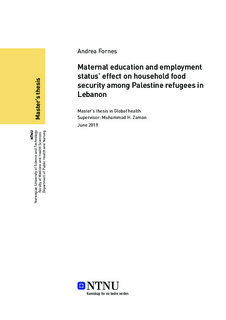| dc.contributor.advisor | Zaman, Muhammad | |
| dc.contributor.author | Fornes, Andrea | |
| dc.date.accessioned | 2019-09-15T14:00:31Z | |
| dc.date.available | 2019-09-15T14:00:31Z | |
| dc.date.issued | 2019 | |
| dc.identifier.uri | http://hdl.handle.net/11250/2616844 | |
| dc.description.abstract | Bakgrunn: Manglende matsikkerhet er et stort globalt problem, og en spesielt utsatt befolkning er palestinske flyktninger. Manglende matsikkerhet kan øke disse flyktningenes risiko for feilernæring og en rekke andre helseproblemer. Denne studien undersøker matsikkerheten blant disse flyktningene i Libanon og diskuterer det i lys av relevant teori om utdanning, jobbstatus, helse og andre faktorer som er inkludert i UNICEFs konseptuelle rammeverk for årsaker til feilernæring. Dette er faktorer som er koblet i en «feedback loop» og påvirker hverandre. Å jobbe mot økt matsikkerhet og generell forbedring av elementer i denne loopen er viktig. Målene for denne studien var å undersøke forholdet mellom mødres utdanning og jobbstatus, og husholdningenes matsikkerhet blant palestinske flyktninger i Libanon. Videre ønsket vi å se hvordan dette forholdet ble påvirket av andre variabler i husholdningen, og å bruke denne informasjonen til å forstå betydningen for denne befolkningens matsikkerhet og helse.
Design og metode: Dette er en kvantitativ studie basert på data samlet inn av forskere fra det amerikanske universitetet i Beirut og FNs hjelpeorganisasjon for palestinske flyktninger i Midtøsten (UNRWA), originalt for bruk i «Survey on the Socioeconomic Status of Palestine Refugees in Lebanon» fra 2015. Analysen ble gjennomført i Stata programvare for å gjøre kjikvadrattest, spredningsplott og logistiske regresjonsanalyser.
Resultater: Det er en klar sammenheng mellom mødres utdanning og husholdningens matsikkerhet, og høyere utdanning reduserer oddsen for alvorlig manglende matsikkerhet. Å være jobbsøkende/arbeidsledig øker oddsen for manglende matsikkerhet. Begge disse effektene ser vi både blant mødre og husholdningsleder, men effekten er alt i alt større for husholdningsledere. Alle regresjonsmodellene var signifikante (p=0.000).
Konklusjon: Denne studien har vist at det er et forhold mellom mødres utdanning og husholdningen matsikkerhet, og at mødre med høyere utdanning har en signifikant beskyttende effekt mot både mild til moderat manglende matsikkerhet og alvorlig manglende matsikkerhet. Signifikansen for alvorlig matsikkerhet bestod ved kontroll for alle de inkluderte variablene. Denne studien fremhever kompleksiteten i situasjonen og viser at fokus på økt tilgang til utdanning for kvinner kan ha stor verdi for fremtiden til palestinske flyktninger i Libanon. | |
| dc.description.abstract | Background: Food insecurity is a major problem worldwide, and one population exposed are Palestine refugees. Food insecurity can put these refugees at risk of malnutrition and other health issues. This study investigates the food insecurity among these refugees in Lebanon and discusses it with relevant theory on education, employment, health and other factors that are included in the UNICEF malnutrition framework. These are factors that are connected in a feedback loop and affect each other. Working towards increasing food security and improving factors in this loop is important. The objectives of this study were to examine the relationship between maternal education and employment, and household food security among Palestine refugees in Lebanon. Further we wanted to see how this was affected by other household variables and to use this information to understand what this means for the population’s food security and health.
Design and methods: This is a quantitative study based on data collected by researchers from the American University of Beirut and The United Nations Relief and Works Agency for Palestine Refugees (UNRWA), originally for the Survey on the Socioeconomic Status of Palestine Refugees in Lebanon from 2015. The analysis was done using Stata software to do chi-square tests, scatter plots and logistic regression analyses.
Results: There is a clear relationship between maternal education and household food security, and higher education decreases the odds of severe food insecurity. Being unemployed increases the odds of food insecurity. Both effects are seen among mothers and heads of households, but the overall effect is bigger for heads of households. All regression models were significant (p=0.000).
Conclusion: This study has shown that there is a relationship between maternal education and household food security, and that mothers with higher education have a significant protection against both mild/moderate and severe food insecurity. The significance for severe food insecurity was still present when adjusting for all included variables. This study highlights parts of the complexity of the situation and show that focus on improving access to education for women can be of great value for the future of the Palestine refugee population in Lebanon. | |
| dc.language | eng | |
| dc.publisher | NTNU | |
| dc.title | Maternal education and employment status’ effect on household food security among Palestine refugees in Lebanon | |
| dc.type | Master thesis | |
